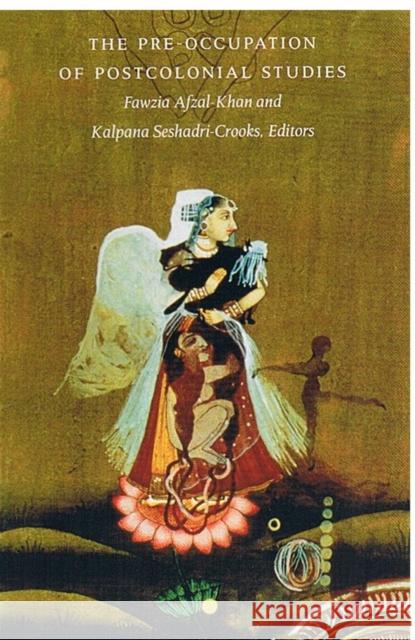The Pre-Occupation of Postcolonial Studies » książka
The Pre-Occupation of Postcolonial Studies
ISBN-13: 9780822324867 / Angielski / Twarda / 2000 / 424 str.
The Pre-Occupation of Postcolonial Studies
ISBN-13: 9780822324867 / Angielski / Twarda / 2000 / 424 str.
(netto: 620,38 VAT: 5%)
Najniższa cena z 30 dni: 490,80
ok. 22 dni roboczych.
Darmowa dostawa!
The Pre-Occupation of Postcolonial Studies contains essays by both leading figures and younger scholars engaged in the field of postcolonial studies. In this state-of-the-field reader, editors Fawzia Afzal-Khan and Kalpana Seshadri-Crooks have created a dynamic forum for contributors from a variety of theoretical and disciplinary vantage points to question both the limits and the limitations of postcolonial thought.
Since it burst on the academic scene as the hot new disciplinary field during the final decade of the twentieth century, postcolonial studies has faced criticism from those who question its troubling trajectories, its sometimes suspect epistemological and pedagogical methods, and its relatively narrow focus. With diverse essays that emerge from such disciplines as South Asian, Latin American, Arab, and Jewish studies, this volume responds to skeptics and adherers alike, addressing not only the broad theoretical issues at stake within the field but also the position of the field itself within the academy, as well as its relationship to modern, postmodern, and Marxist discourses. Contributors offer critiques on ahistorical and universalizing tendencies in postcolonial work and confront the need for scholars to attend to issues of class, ideology, and the effects of neocolonial practices. Seeking to broaden the field s traditionally literary spectrum of methodologies, these essayists take up large thematic issues to examine specific sites of colonial activities with all of their historical, political, and cultural significance. Closing the volume is an insightful interview with Homi Bhabha, in which he discusses postcolonial studies in the context of contemporary cultural politics and theory.
The Pre-Occupation of Postcolonial Studies not only offers an overview of the discipline but also pushes and pulls at the edges of postcolonial studies, offering a comprehensive view of the field s diversity of thought and envisioning clear pathways for its future.Contributors. Fawzia Afzal-Khan, Ali Behdad, Homi Bhabha, Daniel Boyarin, Neil Larsen, Saree Makdisi, Joseph Massad, Walter Mignolo, Hamid Naficy, Ngugi Wa Thingo, Timothy B. Powell, R. Radhakrishnan, Bruce Robbins, Kalpana Seshadri-Crooks, Ella Shohat, Rajeswari Sunder Rajan"











